Mosul battle: 'IS leader Baghdadi' urges no retreat
- Published
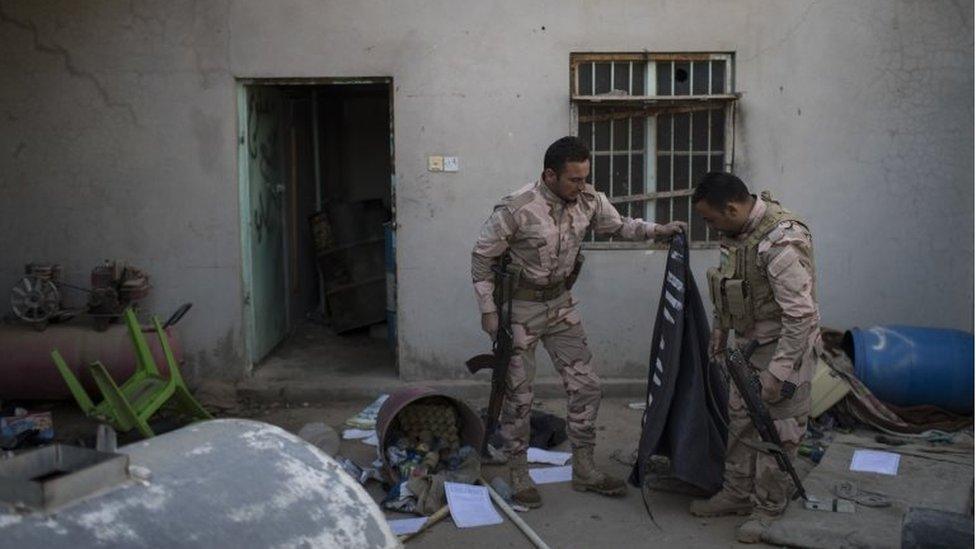
Kurdish Peshmerga soldiers (pictured) are working alongside the Iraqi army, Shia militias and Sunni Arab tribesmen to retake Mosul
So-called Islamic State has released an audiotape purportedly from the group's leader, Abu Bakr al-Baghdadi, urging its supporters not to retreat as Iraqi forces advance on the city of Mosul.
The recording has not been verified yet but analysts believe it is genuine.
Baghdadi's whereabouts are unknown. Some officials have said he may be inside Mosul alongside IS fighters.
It comes two weeks after the launch of a major offensive to retake the last major IS urban stronghold in Iraq.
Some 50,000 members of the Iraqi security forces, Kurdish Peshmerga fighters, Sunni Arab tribesmen and Shia Muslim militiamen are involved in the operation, which is backed by US-led coalition air strikes.
They have already retaken dozens of villages and towns surrounding Mosul, and on Thursday pushed further into the city's eastern outskirts.
Read more:

What did Baghdadi say? By BBC Monitoring
Baghdadi's rallying cry was timed to coincide with the entry of Iraqi forces into the outskirts of Mosul, at a critical moment for the group.
Some of his comments appeared to betray concerns that military pressure on the group in Mosul might lead to a broader erosion of support.
He called on his fighters to obey their leaders, warned Iraqi Sunnis of the consequences of turning against IS and appealed to IS's far-flung outposts - from Indonesia to West Africa - to stay loyal.
Baghdadi rarely speaks publicly, but the last time he did so - in December 2015 - he delivered a similar mix of defiant insistence on ultimate victory combined with implicit acknowledgment of setbacks on the ground.

Who is Abu Bakr al-Baghdadi?
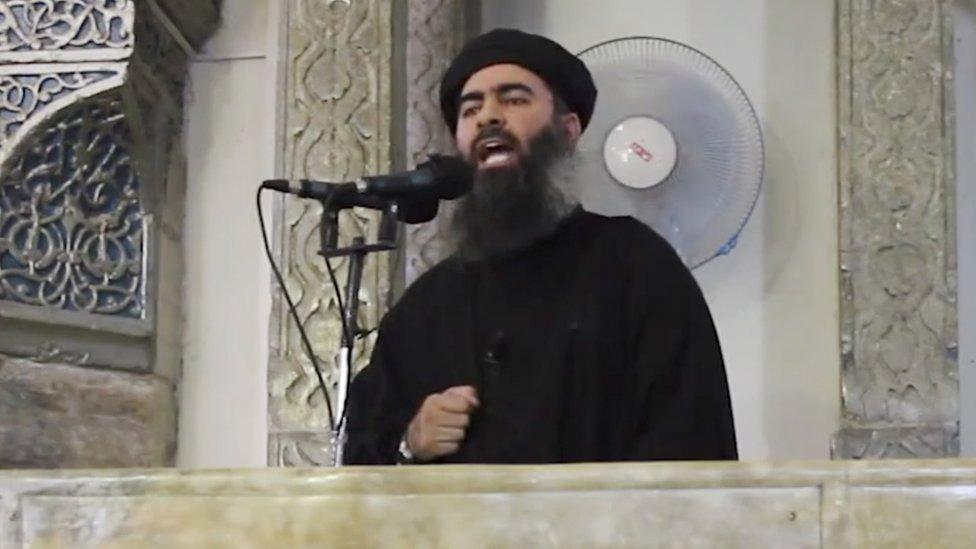
Abu Bakr al-Baghdadi, whose real name is Ibrahim Awwad Ibrahim al-Badri, was born in 1971 to a lower-middle class Sunni Arab family in Samarra, Iraq.
He had a passion for Koranic recitation and was nicknamed "the Believer" for chastising his relatives for failing to live up to his stringent standards.
After pursuing his religious interests at university, Baghdadi gravitated towards violent ultra-conservatives in the Muslim Brotherhood.
He later embraced Salafist jihadism and founded the insurgent group Jaysh Ahl al-Sunnah wa al-Jamaah after the US-led invasion of Iraq in 2003.
After a year in prison, Baghdadi travelled to Damascus to take control of propaganda for al-Qaeda in Iraq (AQI). The group would later be dissolved, in place of Islamic State in Iraq (ISI) - the former name for IS.
Baghdadi quickly rose through the ranks mainly due to his ability to bridge the gaps between the foreigners who founded the group and local Iraqis who joined later.

Will IS fighters stay or go? By Ian Pannell, BBC News, Irbil
The military plan is to hold ground, clear houses and make it safe as the Iraqi army looks for pockets of IS fighters. They know there are secret tunnels and rat-runs between houses and there are IS fighters still in the outlying areas of the city. These fighters are willing to stand and die for their cause and that makes for a very, very tough enemy.
There will be IS fighters trying to get out of the city westwards because that leads to Raqqa, in neighbouring Syria, the last potential remaining IS stronghold if and when Mosul falls.
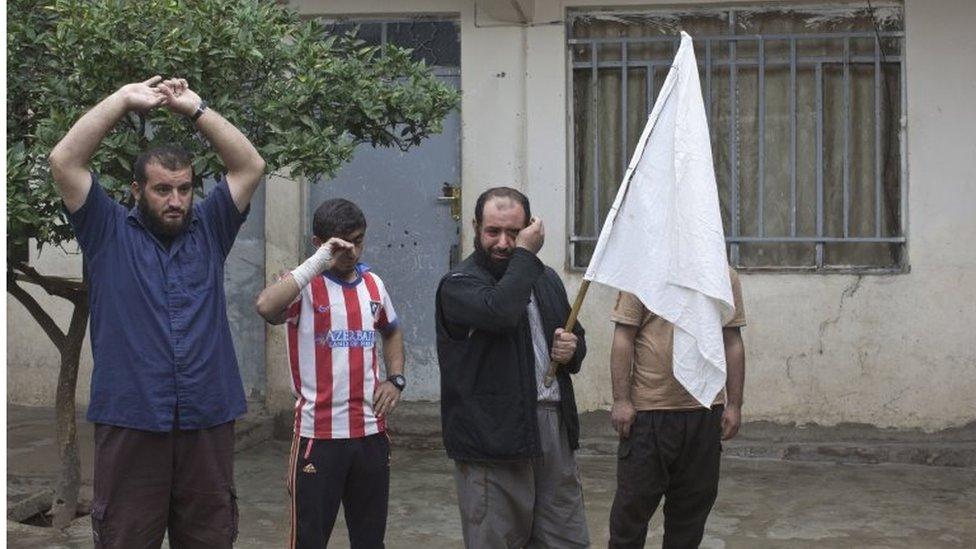
Emotional residents raise a white flag as Iraqi soldiers search their home in Kukjali, in the east
Commanders in Iraq's counter-terrorism forces say some of the IS leadership has already left Mosul. There are likely to be a lot of fellow travellers on the same route - people who were perhaps pleased to see IS fighters enter Mosul in the first place because of poor relations and treatment by some of the government forces who had been in control.
There are also many foreign fighters who have nowhere else to go and who will stand and fight to the death.

How is the advance going?
On Thursday, the head of the Iraqi military's Nineveh Operations Command, Lt-Gen Abdul Amir Yarallah, announced that units of the ninth armoured division and the third brigade had entered the eastern Intisar district.
An army source told the BBC that civilians had started to flee Intisar and the Sumer area, to the south, as the troops advanced and the fighting spread.
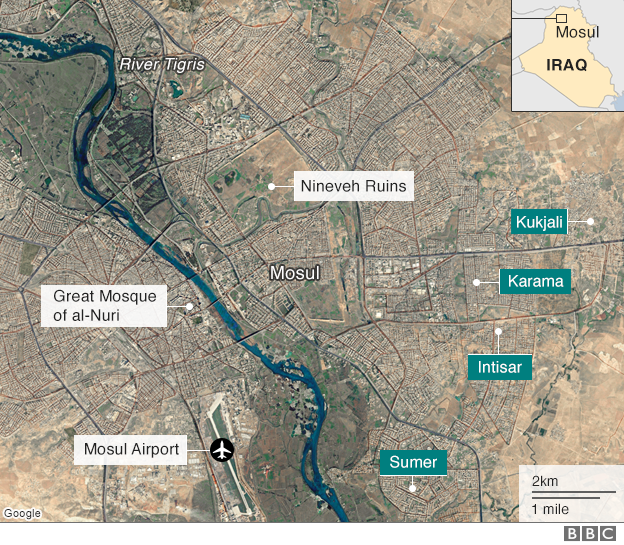
Clashes were also reported in the suburb of Kukjali and on the edge of the adjoining Karama district, where elite Counter-Terrorism Service forces are deployed.
The source also said that security forces were approaching the Iraqi police academy complex in the Shalalat area north-east of Mosul, meaning they would soon be close to the Qahira and Tahrir districts.
Meanwhile, the Shia-led Hashd al-Shaabi (Popular Mobilisation) paramilitary forces are focusing their efforts on retaking Tal Afar, a town about 50km (30 miles) to the west, which lies on the main road between Mosul and Raqqa, the de facto IS capital.
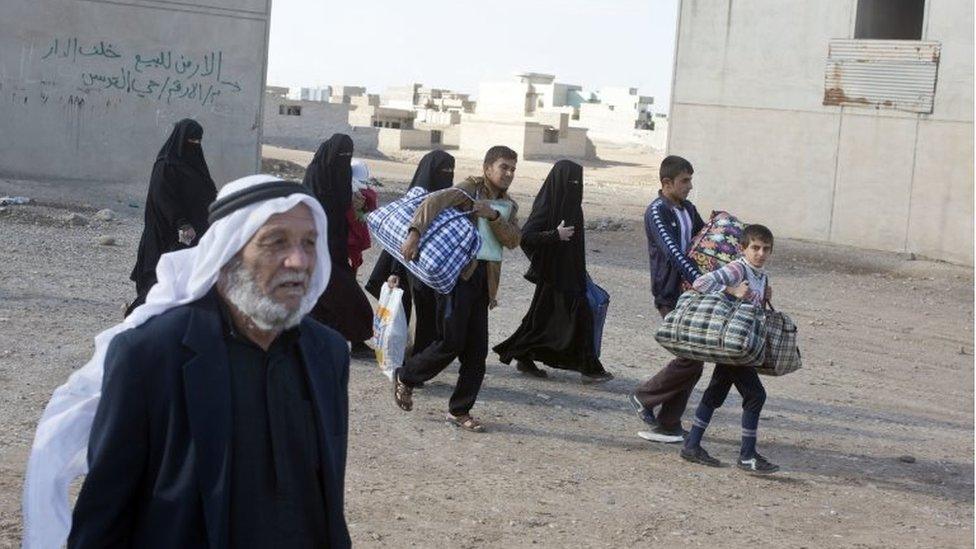
Some civilians have been returning to the district after being displaced by the fighting
Meanwhile, Amnesty International said, external people suspected of having ties to IS have been beaten, given electric shocks or dragged through the streets by cars as areas on the outskirts of Mosul were retaken by Sunni tribal militia fighters, according to eyewitnesses on the ground.
There are also concerns for the more than one million civilians who remain inside Mosul, with the Norwegian Refugee Council warning that their lives are in "grave danger" because of the fighting.
More than 21,700 civilians have fled since the offensive began on 17 October.
